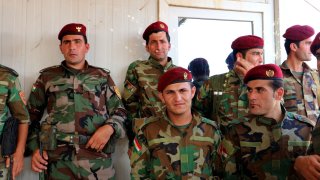The Kurds Remain a Vital Ally as Regional Threats Grow
The U.S. commitment to modernizing the Peshmerga should be extended for over the next decade.
One anonymous senior Iraqi official said in April that talks to leave Iraq could last beyond the U.S. elections. The ebb in Iranian-sponsored attacks on U.S. troops since February might be the quiet before the storm, similar to the Taliban model of not engaging U.S. forces until withdrawal was in sight. That could be a trap for President Trump, similar to how President Biden felt he could leave Afghanistan with dignity. “Even if the coalition leaves Iraq, it should continue in Kurdistan. It’s a win-win situation. Kurdistan is their watchtower to monitor neighboring countries, and to track deadly extremists like ISIS, Hezbollah, and the next emerging threats,” said VP Sheikh Jaafar.
Renewing the commitment to modernize the Peshmerga should extend beyond 2026. Gen. Hazhar says it should last “until at least 2030.” VP Sheikh Jaafar stresses that the United States should stay “at least ten years longer,” echoing what KRG President Nechirvan Barzani and PUK leader Bavel Talabani requested at the Baghdad summit. America’s Iran-linked and ISIS adversaries have mastered the art of patience. The United States must base its regional strategy on performance and security, not an arbitrary calendar.
Zach D. Huff is a Kurdish affairs expert who has reported from the region since 2015 and holds an MA in Middle Eastern Studies from The University of Chicago. As a member of the U.S. armed forces, the views presented are those of the author and do not represent the official policy or views of the U.S. Department of Defense or its components.
Image: Imascaretti / Shutterstock.com.

